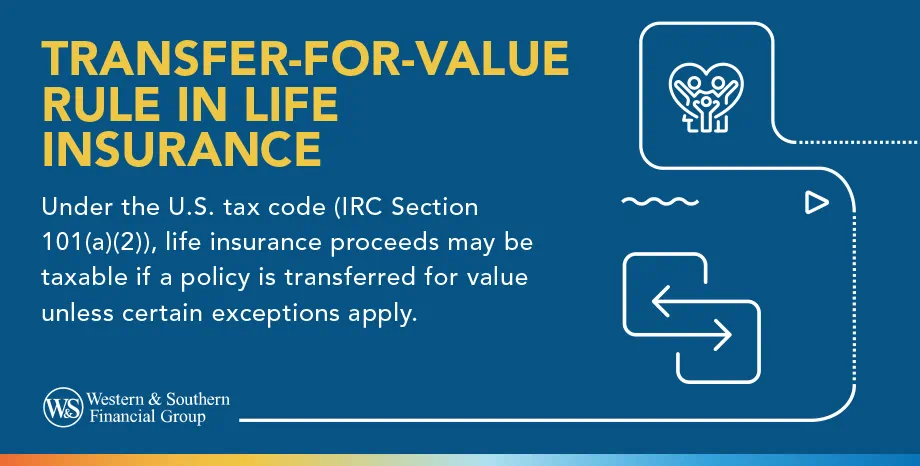

Key Takeaways
- If a life insurance policy is transferred to another party for valuable consideration, the death benefit may become partially or fully taxable.
- Valuable consideration may be related to something of value, such as money or property.
- Even if a life insurance policy is transferred for valuable consideration, the death benefits may remain income tax-free when certain exceptions apply.
- Due to the complexities of tax laws and individual circumstances, individuals involved in life insurance transfers may want to seek guidance from a qualified tax or financial professional.
Life insurance can be simple, until it's not. For example, understanding the nuances of taxation is essential. And standing out as a crucial aspect is something called the "transfer-for-value rule." Outlined in Internal Revenue Code Section 101(a)(2), the rule comes into play when the ownership of a life insurance policy changes hands for valuable consideration.1
Let's explore the transfer-for-value rule life insurance considerations. Those include its implications for the taxation of life insurance proceeds, its fundamentals and some key considerations for navigating the intricacies of policy transfers. Whether you're a policyholder, a potential buyer or a financial professional, a grasp of this rule is vital for making informed decisions in the realm of life insurance.
What Is Transfer-For-Value Rule?
The transfer-for-value rule is a provision in the U.S. tax code (IRC Section 101(a)(2)) that addresses the taxation of death benefits when a life insurance policy is transferred for valuable consideration. Under normal circumstances, life insurance death benefits paid to beneficiaries are generally income tax-free. However, if a life insurance policy is transferred to another party for valuable consideration, the death benefit may become partially or fully taxable.
When Does the Transfer-For-Value Rule Apply?
If a life insurance policy is transferred for valuable consideration and the original owner or a related party is not the insured, then the death benefit is subject to income tax to the extent of the consideration received and any subsequent premiums paid by the new policy owner.
Death benefits paid to a beneficiary under a life insurance policy are still income tax-free - even when the policy was transferred for valuable consideration - if the transfer-for-value rule doesn't apply. How so? For example, if the transfer falls under one of the eligible exceptions.
What Are the Eligible Exceptions?
The transfer-for-value rule provides certain exceptions. In such instances, the death benefit remains tax-free even after a transfer for valuable consideration. The exceptions include:
- transfers to the insured,
- transfers to a partner of the insured,
- transfers to a corporation where the insured is a shareholder or officer and
- transfers where the transfer-for-value rule doesn't apply under the specific circumstances outlined in the tax code.
Help protect your benefits from taxes. Request a Life Insurance Quote
How Does the Rule Affect Taxes?
When the transfer-for-value rule applies, the taxable amount is generally the death benefit MINUS the consideration paid for the policy and any subsequent premiums paid by the new policy owner. So the tax is applied only to the GAIN in the policy, not the entire death benefit.
Even if a life insurance policy is transferred for valuable consideration, the death benefits may remain income tax-free if the transfer-for-value rule doesn't apply. For example, if the transfer falls under one of the previously listed exceptions.
What Is the Impact on Life Insurance Policies?
The transfer-for-value rule impacts life insurance planning. For example, individuals considering transferring a life insurance policy should be aware of the potential tax consequences. Careful planning and understanding of the tax implications are essential to avoid unexpected tax liabilities.
The transfer-for-value rule is primarily a concern when policies are sold in the secondary market or transferred between parties for consideration. Transfers due to gifts or inheritance generally don't trigger the rule.
Transfer for Value: Case Example
One of the clearest illustrations of the transfer-for-value rule in life insurance is when an original policyholder sells their policy to a third party in exchange for something of value. This kind of transaction can trigger tax consequences that might otherwise not apply.
Scenerio
Let’s say John owns a life insurance policy with a $500,000 death benefit. He’s both the policyholder and the insured. At some point, John sells the policy to Sarah for $100,000. Sarah becomes the new owner and beneficiary, but John remains the insured.
Because the policy was sold for valuable consideration - Sarah’s $100,000 payment - the transfer-for-value rule may apply. This rule can limit the portion of the death benefit that remains income tax-free.
Potential Tax Implications
If the rule applies, the taxable portion of the death benefit is calculated using the formula:
Death Benefit − (Purchase Price + Any Subsequent Premiums Paid by the Buyer)
Continuing with the example:
- Sarah buys the policy for $100,000.
- She pays no additional premiums.
- When John passes away, the policy pays out $500,000.
$500,000 − $100,000 = $400,000
In this case, up to $400,000 of the death benefit could be taxable income for Sarah.
Exceptions That May Apply
The transfer-for-value rule includes important exceptions. If the policy is transferred to certain parties—such as the insured, a business partner of the insured, or a corporation in which the insured is a shareholder—the death benefit may still be fully tax-free.
Final Thoughts
This is a simplified scenario. The real-world application of the transfer-for-value rule can be far more nuanced, especially when ongoing premium payments, business relationships, or trust structures are involved. Tax rules may also change over time.
To help avoid unintended tax consequences, anyone involved in a life insurance policy transfer should consult a qualified tax or legal professional who understands the current law and how it applies to their situation.
The Bottom Line
Due to the complexities of tax laws and individual circumstances, persons involved in life insurance transfers may want to seek guidance from a qualified tax or legal professional. Such guidance can be of help in navigating the rules, exceptions and con sequences. The ultimate objective is to ensure the tax implications are properly understood and addressed.
Guidance is just a click away! Request a Life Insurance Quote
Frequently Asked Questions
What is the 3-year rule for life insurance transfers?
The "3-year rule" in life insurance refers to a tax regulation in the U.S. Internal Revenue Code that can impact the tax treatment of life insurance proceeds when the policy is transferred within three years of the insured's death. The rule applies to any transfer of ownership or "incidents of ownership" in a life insurance policy within three years of the insured's death, such as gifting the policy to someone else, selling the policy or placing the policy in a trust.
If the insured dies within three years of the transfer, all of the life insurance proceeds are generally included in the insured's estate for tax purposes. This means the proceeds are subject to estate taxes, potentially increasing the total taxable estate and along with it the amount of estate tax owed.
Who is taxed in the transfer-for-value rule?
In short, if there is to be a tax on the death benefit, it will be owed by the person who ends up owning the policy. Here's why. Under the transfer-for-value rule, if a life insurance policy is transferred for valuable consideration, the death benefit may become partially or fully taxable. If the policy is transferred for a price, the transferee (the person or entity to whom the life insurance policy is transferred for valuable consideration) may be subject to income tax on the death benefit.
Is transferring ownership of a life insurance policy taxable?
The transfer of ownership of a life insurance policy itself is generally not a taxable event. However, tax implications can arise if the transfer is made for valuable consideration, triggering the transfer-for-value rule. Under the rule, if a life insurance policy is transferred for valuable consideration, the death benefit may become partially or fully taxable.
Why should people be careful about transferring ownership of a life insurance policy?
It's important for policyholders, insurance agents and beneficiaries to be aware of the rule when considering any changes or transfers involving life insurance policies. Proper planning and understanding of the tax implications are crucial to avoid unexpected tax consequences.
Sources
- Section 101.—Certain death benefits. https://www.irs.gov/pub/irs-drop/rr-07-13.pdf.

















































